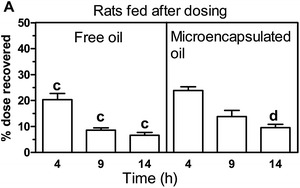Scientists in Australia have investigated the intestinal passage of fish oil using radio labelling to track free or microencapsulated fish oil . Fish oil is of great interest due to its many beneficial health effects, which have been attributed to its high level of long chain n-3 polyunsaturated fatty acids. The bioavailability of oils depends on many factors including their state of emulsification and whether they are delivered in the presence of food.
In this work, Mary Ann Augustin and co-workers compare the oral delivery of free (oil-water mixture) or microencapsulated (oil-in-water emulsion formulation) fish oil to rats, which were then either fed or were not fed after dosing. This was to establish whether access to food after dosing affects the release of the oil. It was observed that feeding after administration of oils increases the rate of progress of oil through the lumen and that microencapsulation delays the lumenal progression of oil in fed rats. Delivery via microencapsulated oil also resulted in increase in the level of radiolabel in the liver and blood which is consistent with an increased bioavailability of microencapsulated oil.
To read the article in full for free, click the link below:
Intestinal passage of microencapsulated fish oil in rats following oral administration, Mary Ann Augustin, Glen Patten, Anthony De Luca, Mahinda Abeywardena, Trevor Lockett, Richard Head and Luz Sanguansri, Food Funct., 2011, DOI: 10.1039/c1fo10149h











